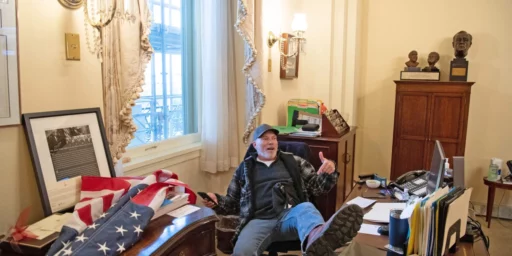What Counterterror Strategists Can Learn from Political Strategists
Thomas Barnett draws an interesting lesson from the rise of YouTube politics. He summarizes a front page WSJ piece on the Montana Senate campaign:
Constant observation of the foe. Unrelenting surveillance. Every gaffe exposed and then run ad nauseum on the web. His ability to orient himself as desired in the race is disrupted.
Conrad Burns, the incumbent, is trailed everywhere on the campaign by a young operative for the Dems who videotapes him non-stop every chance he gets, waiting for the screw-up.
Former Navy Secretary James Webb is doing the same thing, with spectacular success (i.e., the Macaca flap), in his campaign against George Allen.
Barnett argues that this is an application of “5th Generation Warfare” and believes it is the key to defeating the Islamists: “[E]xtending the net is everything in the Long War, because ubiquitous transparency is our calling-card 5GW weapon.”
Thus far, it is the enemy who has used this weapon most effectively, posting beheading videos and other propaganda on the Web to demoralize their foes and recruit future terrorists. They’ve had plenty of help from willing accomplices like Al Jazeera and even neutral Western media who gladly publicize anything bloody or scandalous.
I don’t know exactly we turn the tide in this battle for net supremacy but agree with Barnett that doing so is critical.






While it sounds good on paper, it is, just like “asymmetric warfare”, a tactic to which the US is far more vulnerable than any potential enemy…
Better human intelligence…far better. Beccause you can’t post your enemy’s gaffes, lies and f***kups on the web if you don’t film them.
Less secrecy, because you can’t have “ubiquitous transparency is our calling-card 5GW weapon” if you’re keeping every tiny thing secret.
More reliance on competence instead of secrecy. Because it doesn’t work – eventually incompetence always shines through and then ends up on the web. (Bolton and Rummie are like an Al Qaida propaganda coup on four legs.)
“Hearts and minds” in the target audience – because it won’t work if they think you just fake everything. It has to be authentic and it has to use framing the audience “gets” at a deep level. When it does start working, it reinforces the “hearts and minds” effort as a force multiplier.
Just some thoughts.
Imagine if there were a vid of Osama getting drunk or high, which was undeniably real and surreptitiously filmed, running on every news channel worldwide. Imagine Bush appearing on the same vid to say he understood how hard it was to stay off the sauce/drugs but that he, through deep faith, had managed it. That he didn’t condemn Osama for this weakness because the Lord, by any name, teaches forgiveness for such failures of the will (killing in cold blood is another matter). Imagine every muslim in places like Gaza or Mosul had enough electricity to watch that vid and a job to let them buy a TV.
You won’t get that effect with satellites, drones and wiretaps.
Regards, C
(I’m not saying they would definitely get such footage, its a hypothetical extreme example to put across the idea)
In a political campaign, you generally know who the opponents are well in advance. There is also a “civility” associated with campaigning, for example no one on the Allen staff tried to shoot ‘Macaca’. Campaigns want to get information out, so it is easy to know where the candidate is likely to be on any given day. Finally, there is a limited number of candidates, usually only one or two opponents that you need to worry about.
Those ideas don’t translate well from politics into anti-terror. But I do think there is a germ of an idea here.
Produce slick music videos satirizing and poking fun at the terrorists. Get people in the Arab world to be humming the tune to the Arabic equivalent of “Osama sucks blue donkey d*cks”.
Play up the Muslim victims of terrorist attacks with video, pamphlets, etc.
Distribute tapes and videos for alternate explanation of Koran that doesn’t support terrorism.
Highlight success stories of western Muslims who have been financially successful and have kept their faith in the west.
Websites with tickers showing the number or terrorists killed.
All of these things can be done without endangering intelligent gathering assets. They can also help to undermine morale among the population you are trying to recruit from. You can do them in a variety of styles, from slick professional to amateurish. Whatever works best or a combination.
Legion, I respectfully disagree. The UK ran a very effective assymetrical warfare campaign against the IRA, one that had a massive bearing on eventually bringing them to the negotiating table and their giving up violence. What the UK can do the US can do.
The prescription? One bullet, one target, repeat as needed.
Regards, C
I think that legion is right here. Why play to the enemy’s strengths?
Cernig, I’m not sure I agree with that interpretation of the UK strategy against the IRA. I think a better interpretation is that events (over which neither side had control) caused the IRA’s tactics to be rejected by their supporters.
Hi Dave,
I happened to work with businesses and groups on both sides of the sectarian divide in Scotland during the 80s and 90s – many had definite views and very concrete support for one side or the other. I know what they believed had worked or not worked.
I didn’t say that the UK’s strategy of “shoot to kill” on targeted provos was the only factor, just a major one. There were, of course, several other threads – one was a concerted “hearts and minds” effort to win away their support in the populace. 9/11 helped a lot too – at last US supporters worked out what they had been funding.
Read the post I linked – you lock up the ones you think you can do a deal with later and shoot the ones you can’t. Both the main Sinn Fein leaders spent time in the H block while many compatriots died. Another leader who was imprisoned later turned out to be a double agent for UK intelligence who had been turned while in prison after seeing more hardline leaders dead at the hands of the SAS etc…
Regards, C
But the Brits had significantly more control over the NI situation than we’ll ever have over Islamic terrorism. There are so many groups, with so many conflicting ideologies (to look at just one aspect) that even if people in group A found out we’d been killing lots of group B, that wouldn’t necessarily have the same impact. And as for making them look foolish, well, there are far more cameras available & looking here than in the mountains of the Afg-Pak border. We even did have that reel of… ahhh, I can’t remember who now – some AQ bigwig, I believe – fumbling around with an RPG like he’d never seen one before. While it was good for a laugh, does anybody know if it actually helped us?
Don’t think through, re-look at, strategise, or spend time planning ways to outsmart the enemy, just blame. That’s the new Republican way and perfectly articulated by James in this post. Its Al Jazeera and neutral western media’s fault, when anyone with half a brain has long since concluded that the Iraq war was a colossal mistake and all failures stem from that.
How can anyone take seriously this kind of criticism, when Afghanistan is once again falling back into the hands of the very people who sheltered the 9/11 killers.
Youtube, the new weapon in the fight against terrorism? Good God almighty.